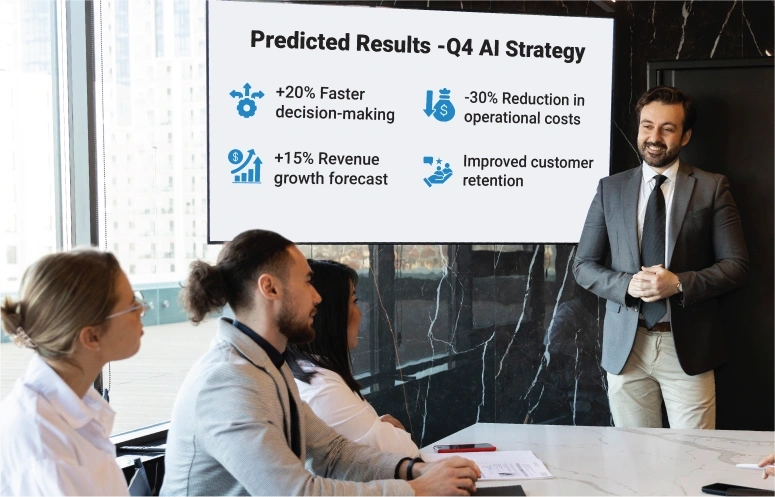The manufacturing industry is evolving faster than ever, bringing both exciting opportunities and growing challenges for top-level executives. From streamlining operations and cutting costs to boosting product quality and meeting rising customer expectations, there’s always something demanding attention. That’s why many leaders are turning to intelligent technologies to gain a competitive edge.
With the power to analyze data, spot patterns, and automate decisions, AI is transforming how manufacturing runs at every level. It helps leaders make smarter choices, move faster, and focus more on strategy and innovation.
In this blog, we’ll explore 9 practical ways AI can support manufacturing executives in their daily work, making everything from planning to production more intelligent and efficient.
1. Reducing information overload
Senior leadership is often bombarded with enormous data coming from departments like production, logistics, inventory, and, sales along with endless emails, texts and, calls from employees, partners and vendors. This deluge of information reduces the creativity and productivity of C-suite leaders. AI can help leaders address this issue by extracting the most valuable information from the larger data sets. This enables leaders to prioritize their tasks and focus on what is important. IBM Verse, Salesforce IQ, and Gluru are some of the best examples of how AI applications can help to solve the information overload issue.
2. Better decision making
Like any other industry, the top-level management in manufacturing also needs to make crucial decisions for their company. The pressure that comes along with these kinds of high-impact decisions depletes the mental energy. This often leads to decision fatigue that increases the likelihood of making drastically poor decisions. The good news is that AI can help leaders make faster and more accurate decisions. AI applications, when fed with an adequate amount of data, can provide C-suite in the company with models for better decision-making.
3. Boosting revenue without increasing investment
One of the major areas to focus for any C-suite in the company is to improve profit margins, boost revenue and get the best return on their current investments without any extra expenditure. Integrating data collected from connected devices to AI helps manufacturers in delivering significant cost savings. The technology assists senior management to make informed decisions at each stage in like which raw material supplier and freight carrier to choose, go for a demand-driven or capacity utilization approach, how to reduce energy consumption and much more. Making correct decisions potentially saves a lot of money, thereby improving profit margins.
Ninety percent of C-level executives reported measurable benefits from deploying AI technologies within their organization – Infosys
4. Reducing inflexibility
The consumer demands are changing and now they look for personalized products rather than standardized ones. No top-level executives want their company to lose customers because of lack of flexibility. However, the traditional practices used in the manufacturing industry make it difficult to cater to the custom requirements of the buyers. In order to get flexible automation, AI-powered industrial robots can be used across the production floor. These robots can be trained to work on a multitude of tasks and can easily adapt to the ever-changing consumer demands.
5. Retaining knowledge
According to the AARP, 10,000 baby boomers are turning 65 every single day, and this is expected to continue into the 2030s. When these experienced employees leave, they take knowledge along with them as well. This knowledge drain is a huge concern for senior level management, as a large chunk of the organization’s budget goes into training and up-skilling employees. AI technology can prove quite useful to retain this knowledge. Before leaving, experienced personnel can transfer their knowledge by training AI models. This would help in creating a centralized and permanent knowledge center that can be accessed by any employee in order to improve their skill and perform better.
6. Attracting younger talent
The manufacturing industry is facing a serious labor shortage issue as baby boomers are retiring and the younger generation does not seem much interested to pursue a career in manufacturing. According to a survey conducted by NAM, 18-24 years olds ranked manufacturing 5 out of 7 as their career preference. Leaders and HR heads supporting the manufacturing organizations are under increased pressure to attract young talent and save the company from this serious issue. Using AI in manufacturing operations will create more tech-related jobs that will eventually draw the interest of the younger tech-savvy generation.
7. Reducing manufacturing waste
As a part of the corporate social responsibility, CEOs in the manufacturing sector are always concerned about reducing environmental pollution and manufacturing waste. Some of the major reasons behind this excessive waste in manufacturing plants are overproduction, poor inventory management, defects in production, mishandling, excess motion and more. AI can help to streamline these processes with better forecasting, improved quality control, and increased automation thereby offsetting a considerable amount of waste.
8. Creating a safer production environment
Safety in manufacturing is an important part, as it not only avoids accidents, illnesses or death but also helps to reduce cost and improve the bottom line of the business. Leaders in this industry continuously struggle to promote and maintain a safe environment for workers. Artificial intelligence is allowing companies to integrate predictive maintenance and other wide range of safety solutions. This technology helps to monitor the performance of machines across the production floor and identify anomalies in order to safeguard workers against any hazard. Moreover, AI-powered fatigue monitoring systems can be used that tracks the signs of worker fatigue and alert the supervisor to avoid any mishap.
9. Combating cybersecurity
Technology is not only improving efficiency in the manufacturing sector, but it is also creating cybersecurity related issues that CEOs and top-level management must address. Attackers are now more interested in stealing Intellectual property (IP) and trade secrets over user information and credit card details. Competitors and new entrants in the industry use this stolen information to save their R&D expenditure, thereby making manufacturing companies more susceptible to cyber threats. AI helps to develop smarter and automated security systems for the manufacturing industry that use both supervised and unsupervised learning for detecting attacks.
How to implement AI in manufacturing operations?
Businesses must define a clear strategy and step-by-step method to implement AI in their manufacturing process to ensure success. The key steps include:
1. Identify areas for AI application
Begin the process by scrutinizing your operational processes and marking the areas where implementing AI would be valuable. The functions can be quality control, maintenance, or inventory management.
2. Gather and organize data
Check your systems to ensure that they collect and store data from equipment, sensors and processes. AI requires accurate and relevant data to process efficiently. Also, appropriate data organization is required for accurate AI-driven insights and decisions.
3. Associate with an AI service provider
Connect with an AI development firm having consultants experienced in developing custom AI solutions. The experts can help you quickly build an AI solution to cater to your business needs and ensure that it incorporates easily with your current systems.
4. Start with proof of concept
Start with a small-scale project to assess the capabilities. This will help you make necessary changes in the beginning, preventing re-work. You can measure ROI and find operational glitches before building the actual solution.
5. Train your staff
Conduct proper training to equip your employees with a proper understanding of AI technologies and the solution that you’ve built. This will help them adapt to this shift quickly, maximizing productivity.
6. Monitor and optimize
Once the solution has been deployed, monitor its performance constantly. Check feedback from users and insights from analytics to make changes, if required.
Key takeaway for leaders in the manufacturing industry:
AI helps senior leadership to deal with complex issues related to their manufacturing units. It lends a helping hand, thereby enabling the top-level management to take the right call at the right time. The ways in which AI can support business leaders in this industry is much more than what is stated here. Get in touch with our AI-experts to understand in detail how AI can actually make a difference for leadership in manufacturing.
How Softweb Solutions helps with custom AI solutions for manufacturing excellence
Softweb Solutions designs tailored AI solutions that align with the unique requirements of manufacturing businesses. We assist them to work smarter, quicker, and more efficiently.
Whether it’s boosting output, predicting equipment breakdowns, or maximizing data utilization, our AI solutions are designed to solve actual problems. We collaborate with organizations to establish their goals and create solutions that facilitate better decision-making and cost reduction, enhancing overall performance.
We help manufacturing companies take full advantage of AI and move confidently toward digital transformation and long-term success.


